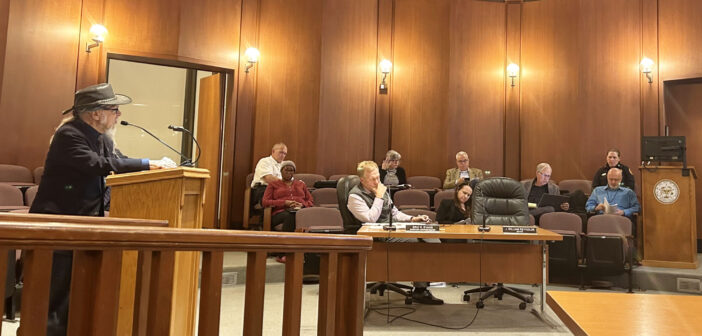The Bethlehem City Council convened on Oct. 15 to discuss rezoning requests for a tentative apartment building located at 119 Technology Drive, the finalization of the Northern Suffolk Railway purchase and Lehigh University grants which will be used to mitigate the city’s housing crisis.
Hesitancy to rezone
A rezoning request previously submitted in 2023 by Serfass Development & Acquisitions I, LLC, proposed the company’s attainment of a new property to develop an apartment complex but was declined by the council.
This time, however, the petitioner, Serfass Development & Acquisitions, introduced the same proposition but with one adjustment — making 10% of the apartments affordable housing.
Council Solicitor Stephanie Steward said this would provide residents with a fixed rent for at least 20 years.
The development consists of over 240 units with onsite parking and amenities. The rezoning would occur near 119 Technology Drive by Fahey Bridge.
A proposal for a public hearing for the rezoning was approved 6-1 and is scheduled to take place on Nov. 19.
During public comment, Bethlehem residents Mary Jo Makoul and Francine Spivak expressed their discontent regarding the prospective rezoning.
“I feel jobs are more important than another big box apartment building,” Spivak said.
Makoul said she’s concerned with how the zoning can impact the environment.
“There’s no way they’re going to be able to build or expand on that area without disturbing the land or lake nearby,” Makoul said.
Norfolk Southern Railway
Norfolk Southern Railway Company has been cooperating with the City of Bethlehem for nearly 20 years to establish a station in the Allentown-Bethlehem area.
The gross $4.4 million sale will allegedly run through South Bethlehem and Saucon Park along the Norfolk Southern Railway which spans over 22 states in the U.S. According to Council President Michael Colón, the railway will extend toward the end of Fahy Bridge to Quakertown.
City Clerk Tad Miller said Bethlehem acquired a $800,000 grant from the U.S. Fish and Wildlife Service through the Pennsylvania Department of Conservation and Natural Resources.
Laura Collins, director of community and economic development, was able to finalize the plans for the city’s project to improve transportation. She said she helped the city sell the last 9/10th of the mile, ending a decade-long ordeal of finding the proper land to purchase for the railway.
According to the memorandum, the agreement with Norfolk Southern Railway Company was “for the purpose of acquiring approximately 11.8 acres, more or less, to develop a public recreational trail connecting to existing public recreational trails in the vicinity known as the Bethlehem Greenway and the Saucon Rail Trail.”
In the discussion, Councilwoman Rachel Leon said, “It’s one of those moments, being on council, where we had very little to do with everything that led up to this moment. It’s really cool to not be the stumbling block before completing a multiple decades-long project.”
The vote passed 7-0. This took the $3.5 million deal to its final amount of $4.4 million, increasing Bethlehem’s revenue in grant funding.
Lehigh University grants are approved
Lehigh has been working with Collins to apply for grants focused on the research and construction of alley houses.
According to the College of Arts and Sciences website, Wes Hiatt, a professor of art, architecture and design, established partnerships between the university, the city of Bethlehem and Community Action Lehigh Valley — an anti-poverty organization that aims to improve affordable housing and increase economic opportunity — to address the housing crisis in the community.
This $500,000 of funding is going towards three or four alleyhouses, depending on construction costs. Lehigh will initially pay for the work and later be reimbursed by Bethlehem.
Councilwoman Kiera Wilhelm and Hillary Glatt Kwiatek, who are also employed by Lehigh, recused themselves from the vote.
The funding passed 4-1, with Councilman Brian Callahan voting in opposition to the grant.
A Lehigh research grant for the alleyhouse — also known as ADUs — pilot program aiming to construct alley houses in West Bethlehem, was passed by the council to explore the efficacy of dwelling units.
According to Lehigh’s research, alley houses are defined as objectively small houses built on land with a primary residence. The name is from its location, as they are typically built facing toward alleyways instead of streets, usually in the primary residence’s backyard.
However, hesitations to fund the ADUs arose regarding parking restrictions and other concerns.
“I am voting nay because I’m adamantly opposed to ADUs, as I think it will increase crime and lower house values in Bethlehem,” Callahan said in the council’s funding discussion.
Wilhelm and Glatt Kwiatek recused themselves from voting once again, and the budget adjustment passed 4-1.
Other items
Callahan addressed a rumor he had heard regarding the homeless population being provided $100 Wawa gift cards, paid for with taxpayer dollars to remove their trash. This was dismissed by Collins.
Collins explained that homeless people were being provided $5 Wawa gift cards via a grant from the Health Bureau of Pennsylvania in an effort to “make the streets of Bethlehem cleaner.”






Comment policy
Comments posted to The Brown and White website are reviewed by a moderator before being approved. Incendiary speech or harassing language, including comments targeted at individuals, may be deemed unacceptable and not published. Spam and other soliciting will also be declined.
The Brown and White also reserves the right to not publish entirely anonymous comments.
1 Comment
Please correct the railroad name to “Norfolk Southern”. Thanks!